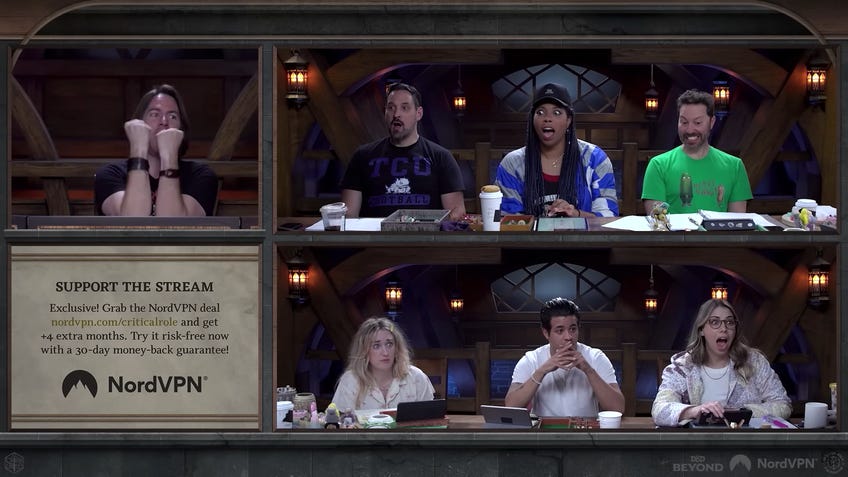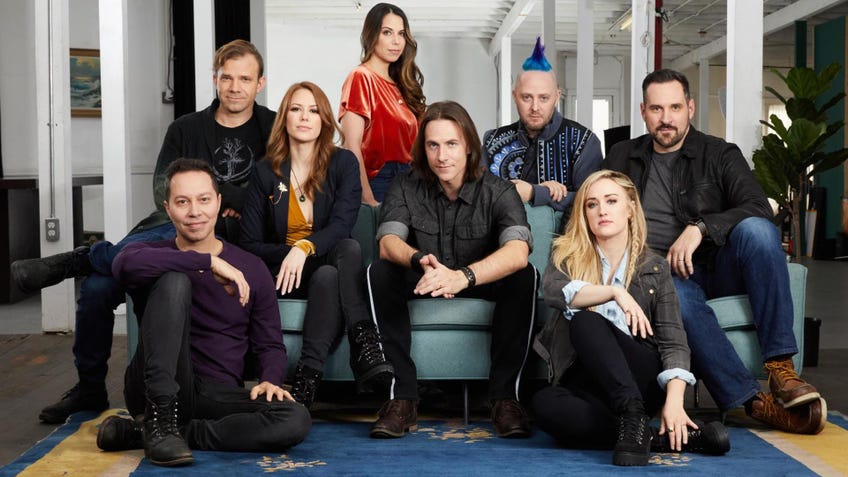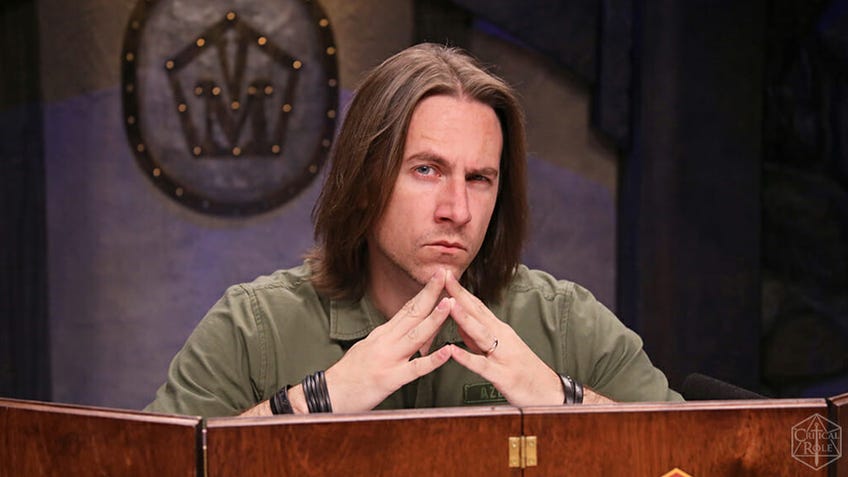"Actual play is a rare type of media where you feel empowered to create": Critical Role's Matthew Mercer on becoming a more relaxed DM and D&D going mainstream
"I’ve grown less and less worried about slipping up here and there."
Matthew Mercer has been the official Dungeon Master for Critical Role since the Dungeons & Dragons actual play series began airing in 2015. Featuring a cast of actors who have played D&D together for many years, Critical Role is a series that has its players rolling dice and acting in front of an audience almost every week. With two full seasons and multiple spin-offs down - not to mention an animated series by Amazon Studios - Critical Role continues to grab audiences almost 10 years after it first debuted.
As its DM and creator, much of Critical Role's success is owed to Mercer - who is currently at work creating his own original tabletop RPG, Syndicult. Dicebreaker spoke with the DM, writer, actor and designer about what he's learnt from his many years running Critical Role, the upcoming animated adaptation of the adventures of The Mighty Nein and why some people prefer to watch other people play D&D rather than play it themselves.
What has so many years of GM-ing for Critical Role taught you about running TTRPGs?
For myself, it has continued to teach and remind me of so many things. I am ever reminded of the importance of listening to your players and crafting opportunities for them to shine, as that’s my greatest joy, watching them beam as they rise to the occasion. I have learned the importance of “covert guidance”, where an intricate plot may elude a party due to your lack of overt clues or details, so to avoid getting stuck in circles you can allow them to roll to “figure out” or uncover more clues so the players can feel accomplished in exploring the world and its mysteries instead of spoon feeding them the answers. I’ve also learned to be ready to abandon your expectations and planned solutions to the dangers and threats you put before them and be ready to follow the path of their own epiphanies or wild ideas to tackle the challenges you lay before them.
I am very precious with our stories, and started out extremely guarded in maintaining accuracy.
I also processed my arc with the RAW (rules-as-written) experience vs FUN balance. When we began streaming and things began to take off, I felt this weird pressure to present the game as close to RAW as possible, largely due to social media shouting at me whenever I made a mistake. As time has progressed, however, I’ve grown less and less worried about slipping up here and there, and instead focus on the player’s joy and bending a rule here and there to allow for an epic moment of player creativity to transform the game into a highly memorable experience.
With the success of Baldur's Gate 3, are video games the next frontier for Critical Role and Darrington Press?
Oh my goodness, that would be friggin’ amazing! I’ve been an avid gamer my whole life, let alone an obsessive player of RPGs since the first Final Fantasy/Dragon Warrior. To make the leap into video games would be an incredible endeavor, but would also require both the right idea, the right development studio, and overall… the right budget. So, I would LOVE to see that in the future, should all those stars align!

What lessons have you learnt from The Legend of Vox Machina that you like to/or plan to employ in the making of the Mighty Nein animated series?
Oh man, so many. First and foremost, I have learned to be ok with “change.” I am very precious with our stories, and started out extremely guarded in maintaining accuracy, but the experience has helped teach me that such intensity doesn’t always make for the best transmedia experience.
[Watching actual plays] can be discovering the thrill of following an earnest story that is being written in real time before your eyes between friends.
I hold firm on the things that are at the core of who we are, what Exandria is, and the moments that are too important to let go, but I am also now more open to the idea of shifting things or letting go of other things, all in the name of a better adaptation for shorter-form media. With this also comes trust in the other incredibly talented people helping put all of this together. There are SO many limitations that arise in the creation of something of this magnitude, but greeting them as a challenge to adapt to as a team most often leads to something unique and wonderful when you surmount them.
I am extremely grateful to be collaborating with such a wide network of incredible creators on these projects, so being present to guide the world, the themes, the characters, and the overall vision while also letting them bring their own joyful spice and ideas to the table makes for such an exciting story to come to life in its own way.
Why do you think some people prefer to watch others play D&D, rather than actually playing it themselves?
I’ve often wondered this myself, and from what I have both seen (and pontificated on) varies based on a number of factors. For some, they lack access to gaming materials or access to a community to play, so they watch AP games as a way to play vicariously through the experience until they are able to bridge that gap themselves.
For others, they might lack the comfort in social settings or interactions to approach and play at a table for now, so AP acts as both a way to watch and learn the game while also working towards becoming more comfortable at the possibility of joining a gaming group.
For others still, it can be discovering the thrill of following an earnest story that is being written in real time before your eyes between friends.
I do think [actual play] has definitely mellowed since the “gold rush” days of the late 2010s
There is an excitement both at the table and within a community in knowing that no one really knows what will happen next, so that still stands as a fresh narrative experience for some. There is also the community that surrounds much of AP, where you both engage with and enjoy the characters, players, and story, AND then can engage with the other fans of those things through discussion, fan art, cosplay, and any other form of fan experiences like other media. A lack of free social time is a common thread, and a number of folks listen in while working or commuting.

That all being said, what I love about AP is it is one of the rare types of media that can draw you in, and you are immediately empowered to create and experience your own version at home with your friends. Love what you see? Feel inspired by a character or story beat? You can go grab a couple books and some dice and be crafting your own epic tale that weekend! I think the pipeline from “watching” to “playing” is fairly rapid for most.
Do you think that the actual play bubble is going to burst? Or could it expand even further into the mainstream?
I do think it has definitely mellowed since the “gold rush” days of the late 2010s, as it is inherently a very long-form time commitment to engage with just ONE actual play series, let alone multiple, so the scale of people who can engage with a massive amount of options has naturally led to a balancing of the space. The pandemic also led to a massive swell in AP engagement, which has also balanced with the slow re-opening of the world, but I could only see it burst for those who attempt to throw unsustainable budgets towards what is STILL a slow-growing field.
I could see it push further into the mainstream, but the adaptation needs care, authenticity, and the right timing. If trends we are seeing are any indication, there is still growing interest with MUCH more room to grow, but part of what makes this whole space magical IS the authenticity and genuine nature of joy and community around the tabletop experience. That can’t be built in a lab, and there have been a number of failed attempts to do so. We think that’s why those who have continued to succeed have, ourselves included, so we just keep following our hearts and cheering on our peers who follow theirs!

